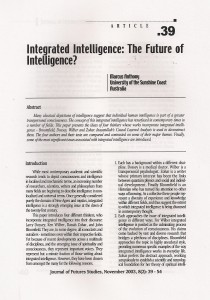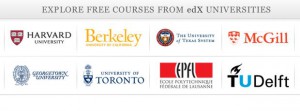SmartPlanet: Free Online Courses Discovering Global Talent
Education, SmartPlanet![]() Massive open online courses discover global talent
Massive open online courses discover global talent
We’re starting to learn more about how massive open online courses — free online classes from some of the world’s top universities — are being used. The four major organizations Coursera, edX, Udacity and Udemy already have millions of users. But while the appeal of gaining knowledge from Harvard or MIT, among many others, is strong about 90 percent of participants never finish or even start their classes. Still, there are real benefits to offering free higher education to anyone in the world.
Namely, they’re helping universities discover talented young people around the world whose talents might otherwise be overlooked by major institutions. The Financial Times reports on one teenage boy from India who was accepted to MIT after his skills caught the eye of the professor who then wrote him a letter of recommendation to attend the university, a win-win for both student and school.
While it seems natural that these college courses attract mostly college-age students and adults who want to continue their education, the number of teenagers who are taking advantage of the services is growing.
And despite the fact that these courses were developed by universities in the United States, they’re attracting a global audience. EdX, a nonprofit founded by Harvard and MIT, gets most of its students from the U.S. than any other country, but two-thirds of students are international and the second highest population of students come from India.
Online courses open doors for teenagers [Financial Times]
Michel Bauwens: Applying Sharing Economy to Education — Comment from Robert Steele and 21st Century Education RECAP
Education
How We’re Applying the Sharing Economy to Education
By Andrew Grauer
A sustainable economy requires that both the supply and demand sides benefit from a transaction. In education, we see so many inefficiencies between those supplying the knowledge and those consuming it. Teachers feel like they’re being underpaid and students feel like they are overpaying for the education they are receiving. This system is broken, presenting an opportunity to recalibrate and bring better equilibrium to the market. We’ve already seen the collaborative consumption business model transform industries from hospitality (Airbnb) to transportation (Lyft), and we believe that education is ripe for a similar disruption.
I founded the online education company Course Hero when I was a student at Cornell. I was frustrated that so much knowledge was bottled up in private hard drives and individual brains without a convenient, accessible forum to share and distribute this knowledge. At the same time, the student lifestyle—balancing homework, jobs and extracurricular activities—wasn’t necessarily conducive to accessing professors, tutors or other help they may need during designated office hours. I saw an opportunity to connect this bottled up knowledge with the students who needed it and create a better learning experience—one that benefits both the expert and the learner.
Digital services are ready for a business model change, which is why Course Hero is working to build an online “knowledge marketplace” where experts can make money sharing their expertise, and learners can consume that content when and where they need it. By incentivizing experts of all forms to interact with Course Hero’s existing user base of learners, the knowledge marketplace is able to scale while providing consistent, quality content that meets the demands of learners. Like the retired miner who signed up with Lyft to earn extra cash shuttling city-dwellers around San Francisco, Course Hero is empowering a new class of microentrepreneurs who are financially rewarded for sharing their knowledge on their own time in the form of courseware, documents and tutoring advice.
A knowledge marketplace can provide a powerful supplement to the traditional learning experience. For example, since professors, TAs and tutors have limited availability, we developed Course Hero’s online tutoring platform that invites students to ask questions, and experts to get paid for answering as many or as few student questions as they want. Office hours can be impossible to make, however an open tutoring platform ensures that an expert will be able to assist a student even at 2:00 am the night before a final — often when the student needs it most.
Berto Jongman: Free MindShift Seminar Online with Craig Hamilton
Culture, Education, P2P / Panarchy, Politics, Resilience, TransparencyFREE ONLINE BOTH LIVE AND AS DOWNLOADABLE RECORDING
If, in your deepest hopes and ambitions for a better self and a better world, you’ve sensed that something more is possible–yet has so far eluded us–you’re right.
Activating the Impulse of Evolution
The simple and radical shift that can liberate you from the patterns of the past and unlock the door to an authentic enlightened life.
Most of us assume that the human condition is a fixed state and that we have no choice but to work within it–or fight it every step of the way.
But emerging wisdom is proving otherwise, and that game-changing discovery has yielded a revolutionary path to personal and cultural transformation.
Recommended by Barbara Marx Hubbard, Ken Wilbur, Jean Houston, Brian Thomas Swimme, Michael Beckwith,Terry Patten, and Claire Zammit
John Maguire: YouTube (12:24) Edgar Morin on Learning to Live and Learn (French with English Sub-Titles)
Education, Knowledge, YouTubeEdgar Morin on how to live, learn, and thrive in a world ruled by non-linear complexity and interdependence:
Reference: Integrated Intelligence: The Future of Intelligence (2003)
Collective Intelligence, Cultural Intelligence, Culture, Education, P2P / Panarchy PDF 15 pages: 2003 Integrated Intelligence
PDF 15 pages: 2003 Integrated Intelligence
Abstract
Many classical depictions of intelligence suggest that individual human intelligence is part of a greater transpersonal consciousness. The concept of this integrated intelligence has resurfaced in contemporary times in a number of fields. This paper presents the ideas of four thinkers whose works incorporate integrated intelligence – Broomfield, Dossey, Wilber and Zohar. Inayatullah's Causal Layered Analysis is used to deconstruct them. The four authors and their texts are compared and contrasted on some of their major themes. Finally, some of the most significant issues associated with integrated intelligence are introduced.
Phi Beta Iota: This is the best short summary of the documented works of four great minds that have explored alternative forms of knowing that are compellingly suggestive, as one of the four reviewed authors says, that “Classical science and history will not suffice as the methodologies of the twenty-first century. For these are the stories of colonialization, domination, and segmentation, and ‘Judeo-Christian millenarianism.'” [Bloomfield 1997: 172]. In combination (Phi Beta Iota again), traditional Chinese, traditional Indian, and Islmaic philosophies of balance and governance are going to be major forces in the 21st Century–and being ideational in nature as well as rooted in major demographics, there is absolutely nothing the USA can do about this EXCEPT become a Smart Nation that embraces diversity and the truth on their merits.
Yoda: Hybrid Pedagogy — Teaching and Technology
Education, Knowledge
Hybrid, force is.
A Bill of Rights and Principles for Learning in the Digital Age
Hybrid Pedagogy, 22 January 2013
On December 14, 2012, a group of 12 assembled in Palo Alto for a raucous discussion of online education. Hybrid Pedagogy contributors Sean Michael Morris and Jesse Stommel gathered together with folks from a diverse array of disciplines and backgrounds, representing STEM fields, the humanities, schools of education, corporations, non-profits, ivies, community colleges, and small liberal arts colleges. Among us were adjuncts, CEOs, a graduate student, several digital humanists, and two outspoken educational technology journalists. As a group, we’d chaired online programs, designed MOOCs, dropped out of MOOCs, and the term “MOOC” was even coined in one of our living rooms. The goal of the summit was to open a broader conversation about online learning and the future of higher education. See the story in The Chronicle. This co-authored document, which calls for hacking and open discussion, was the result.
A Bill of Rights and Principles for Learning in the Digital Age
Preamble
Continue reading “Yoda: Hybrid Pedagogy — Teaching and Technology”


